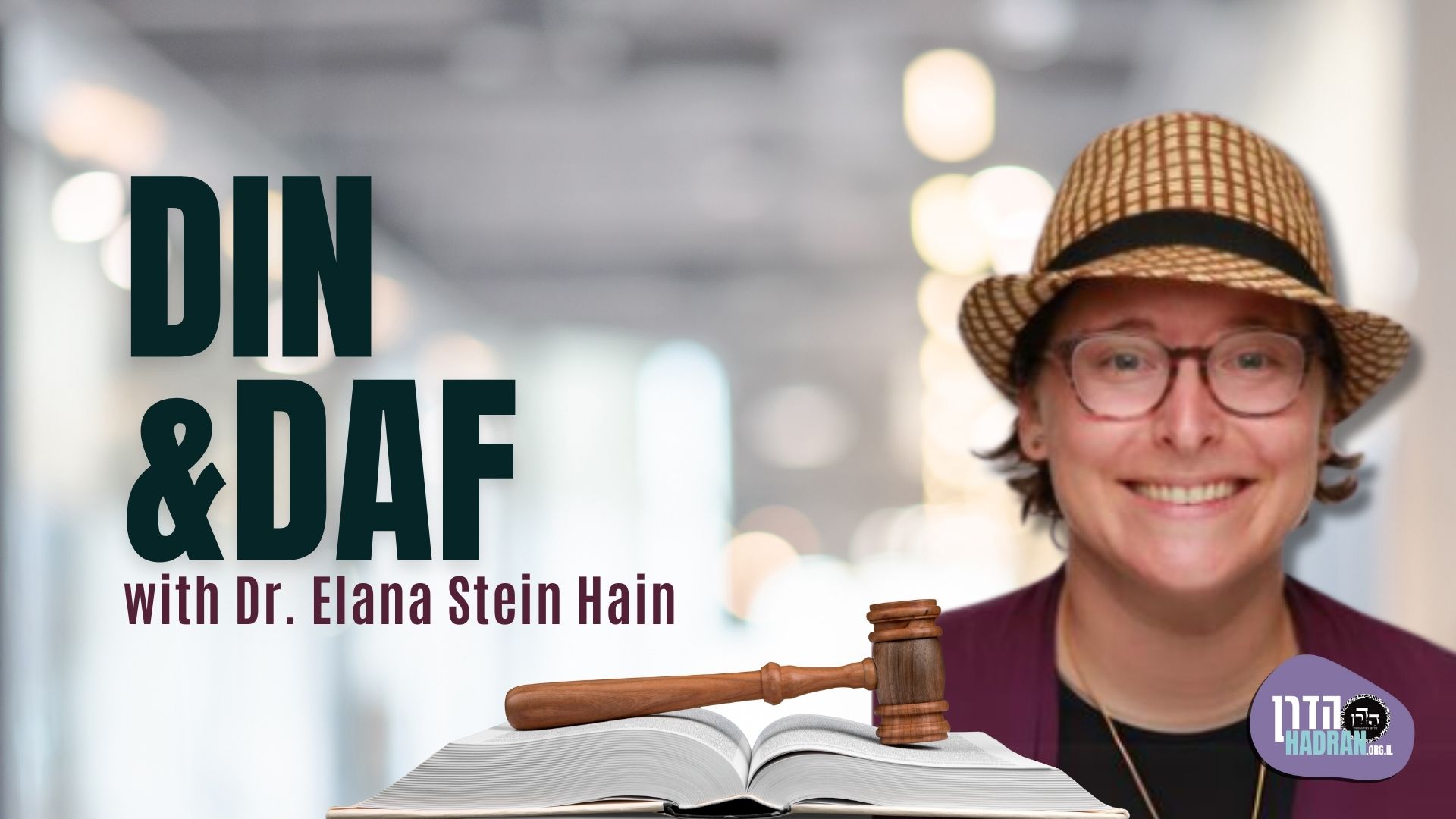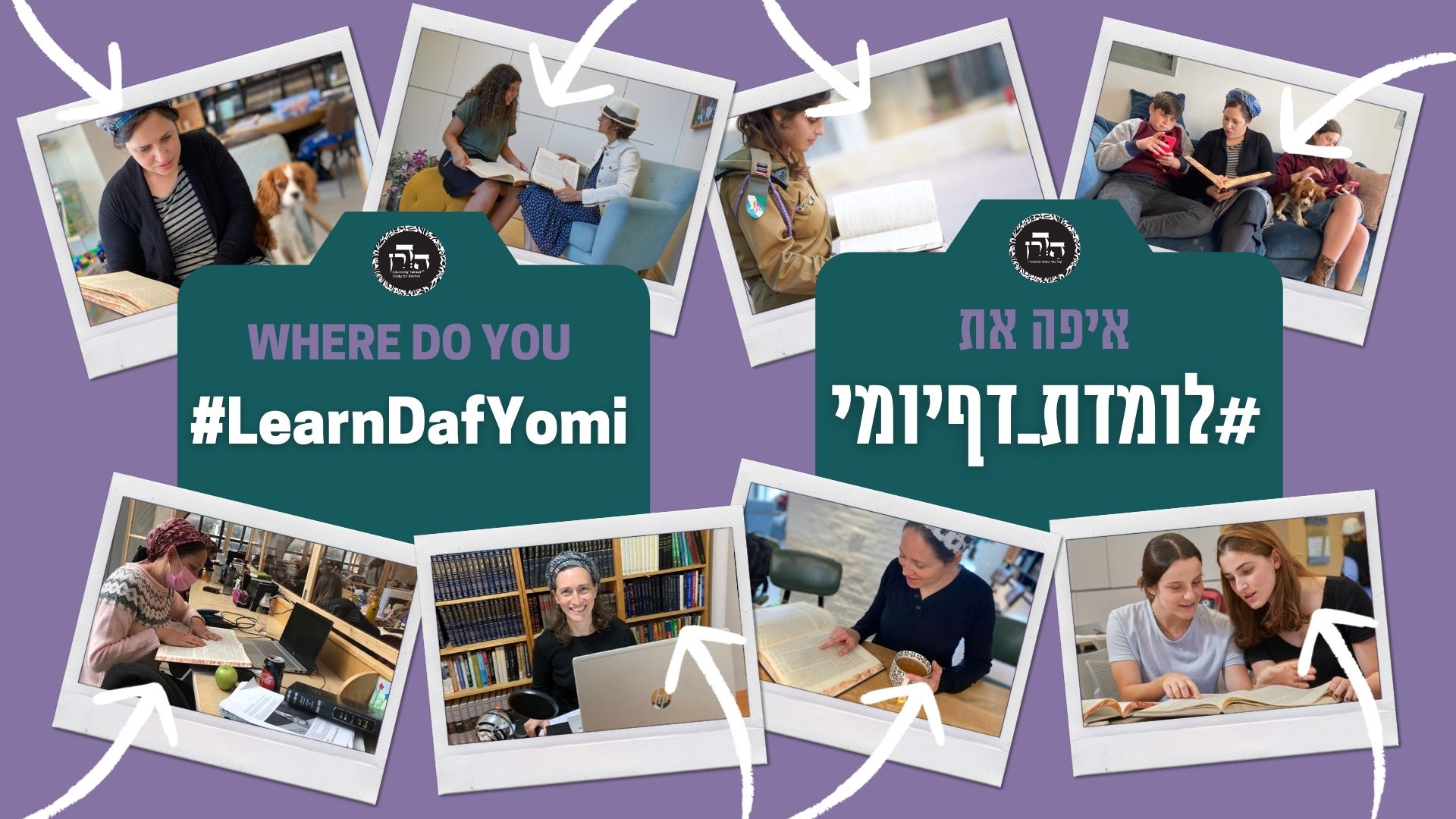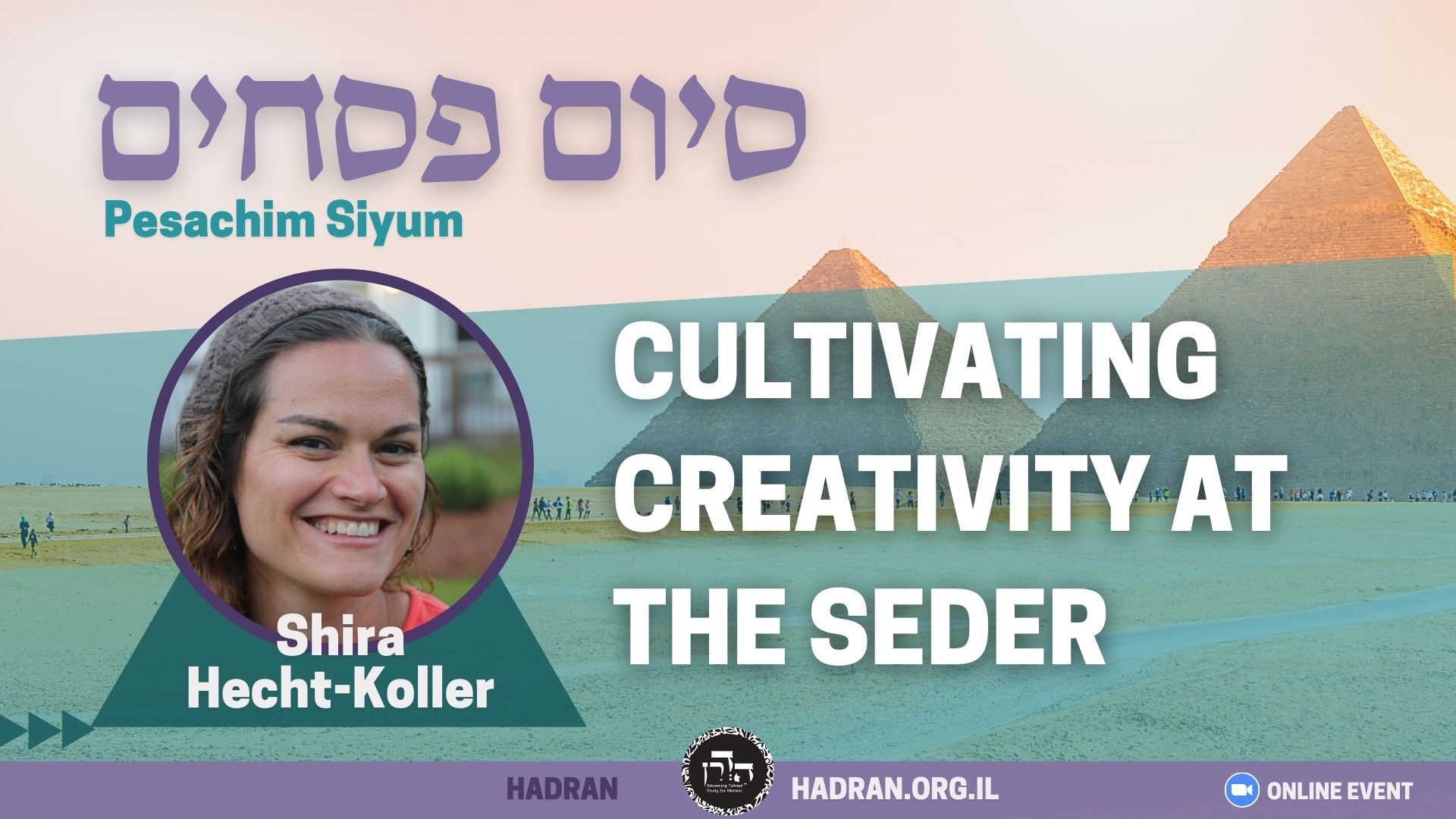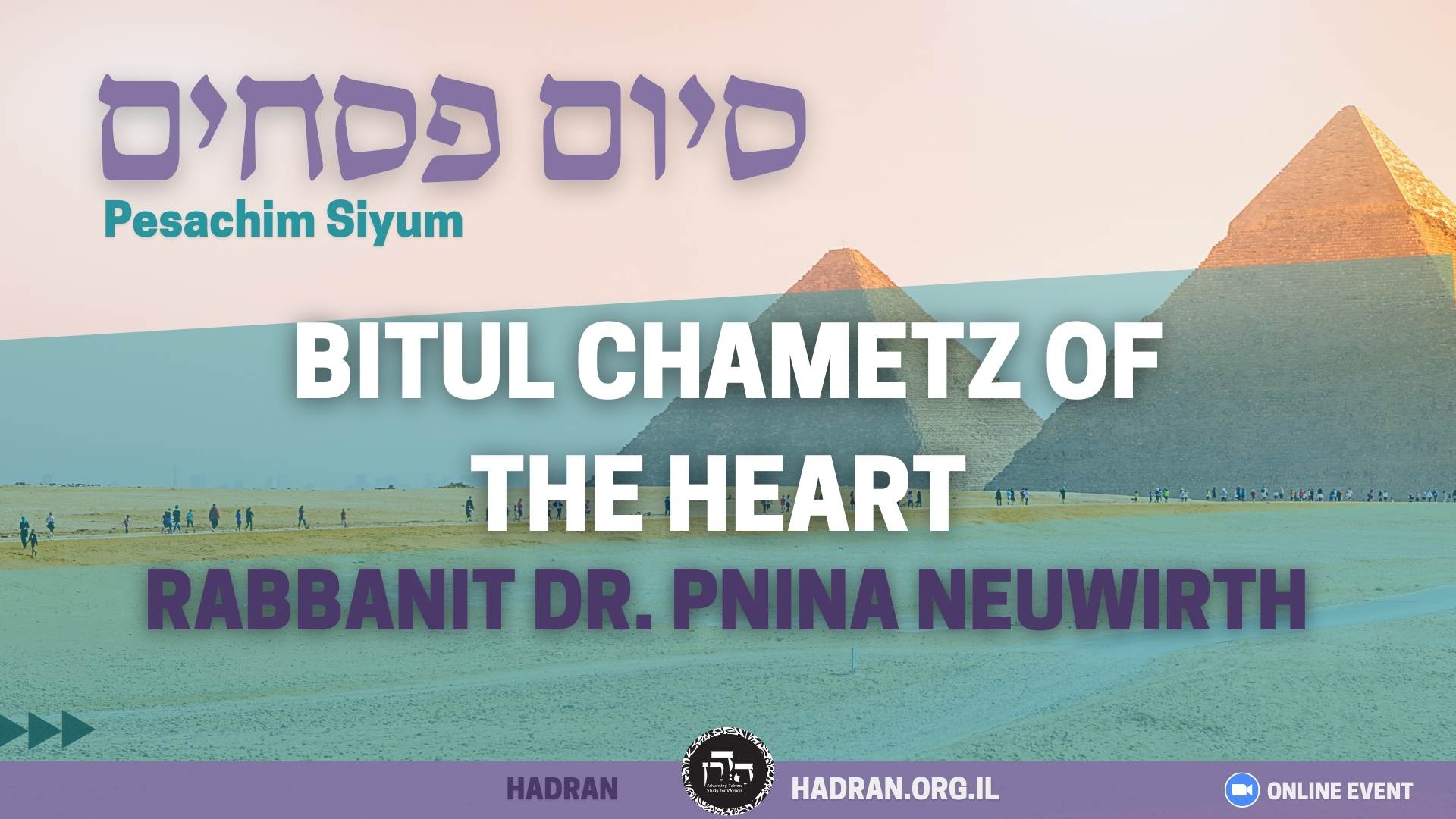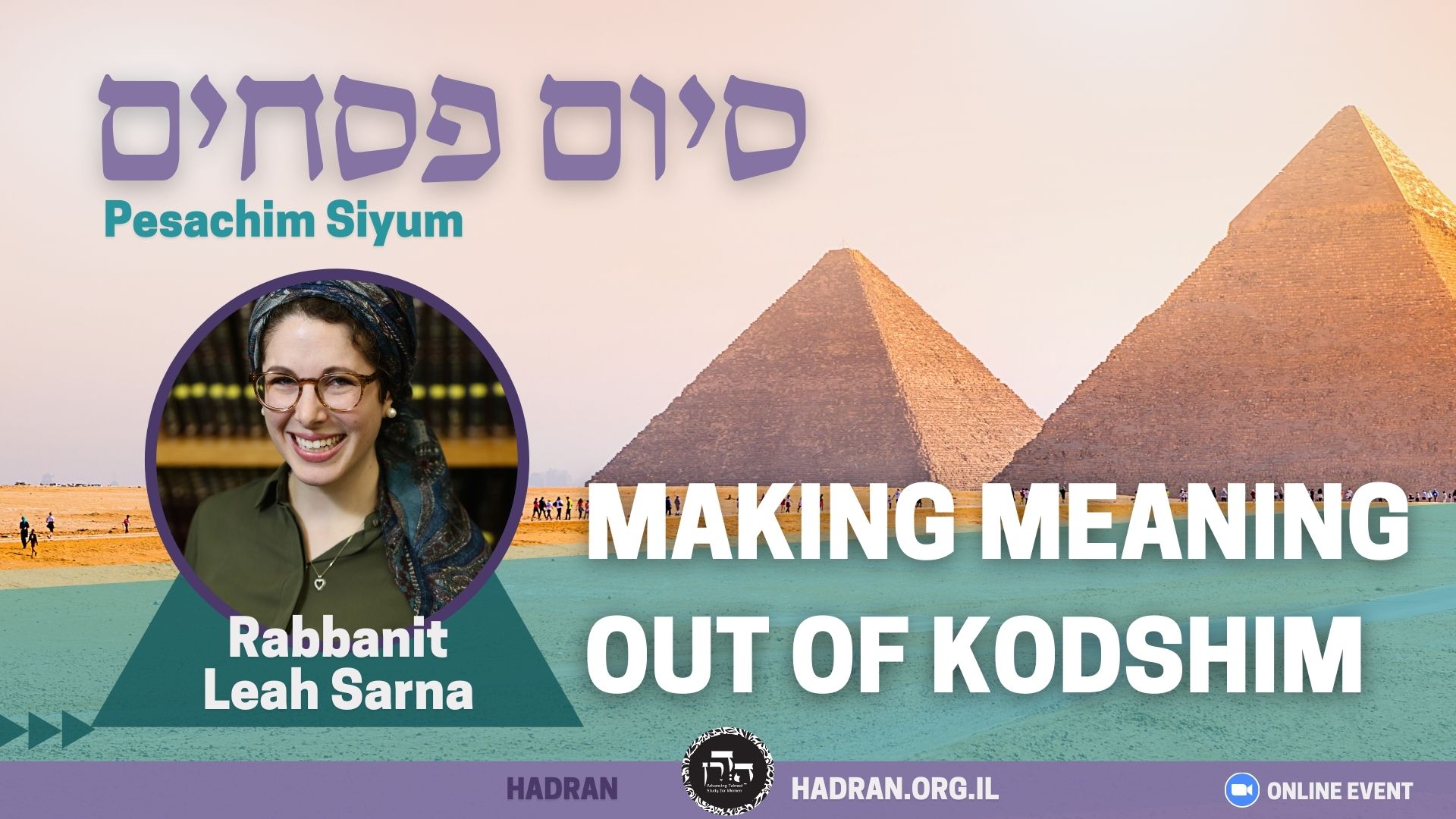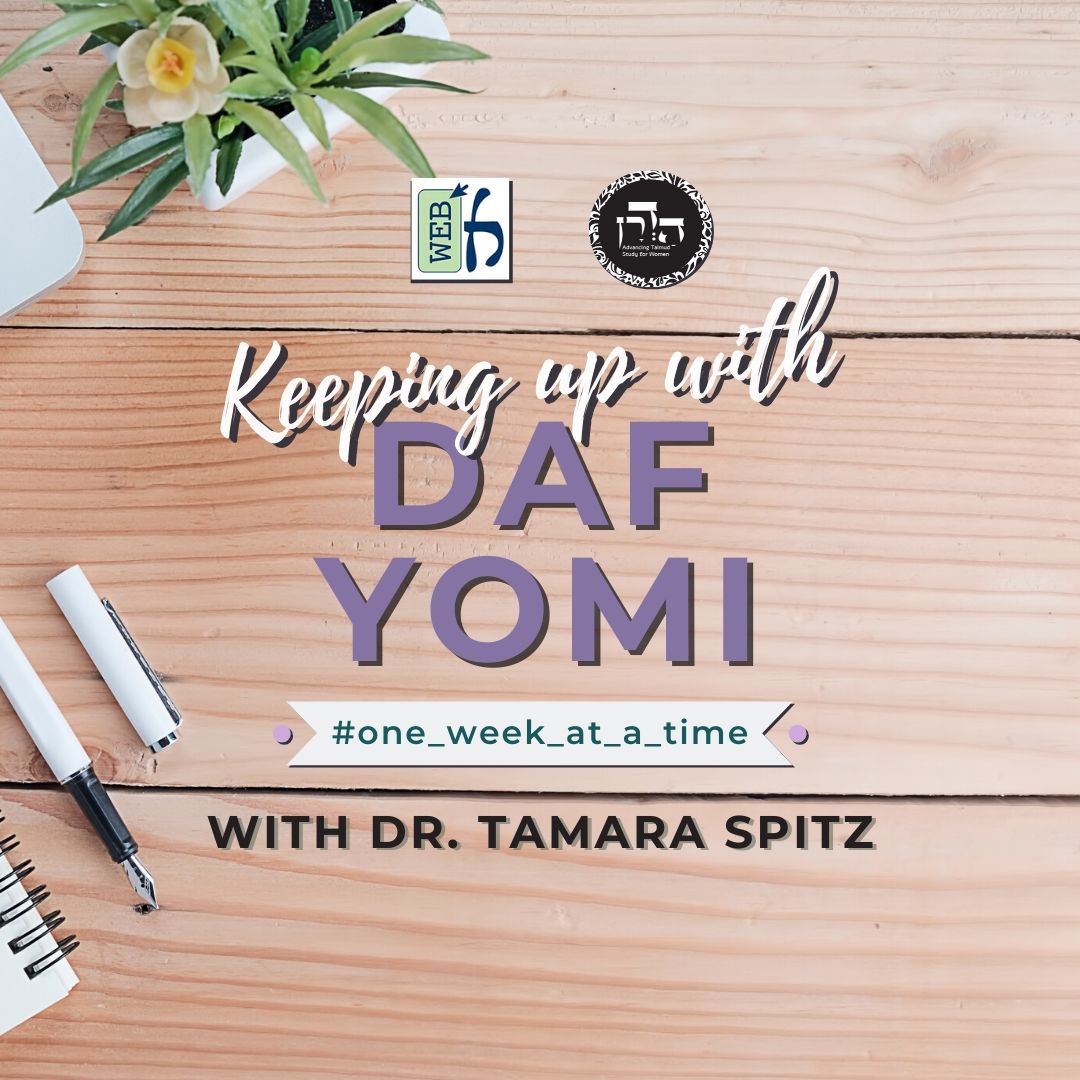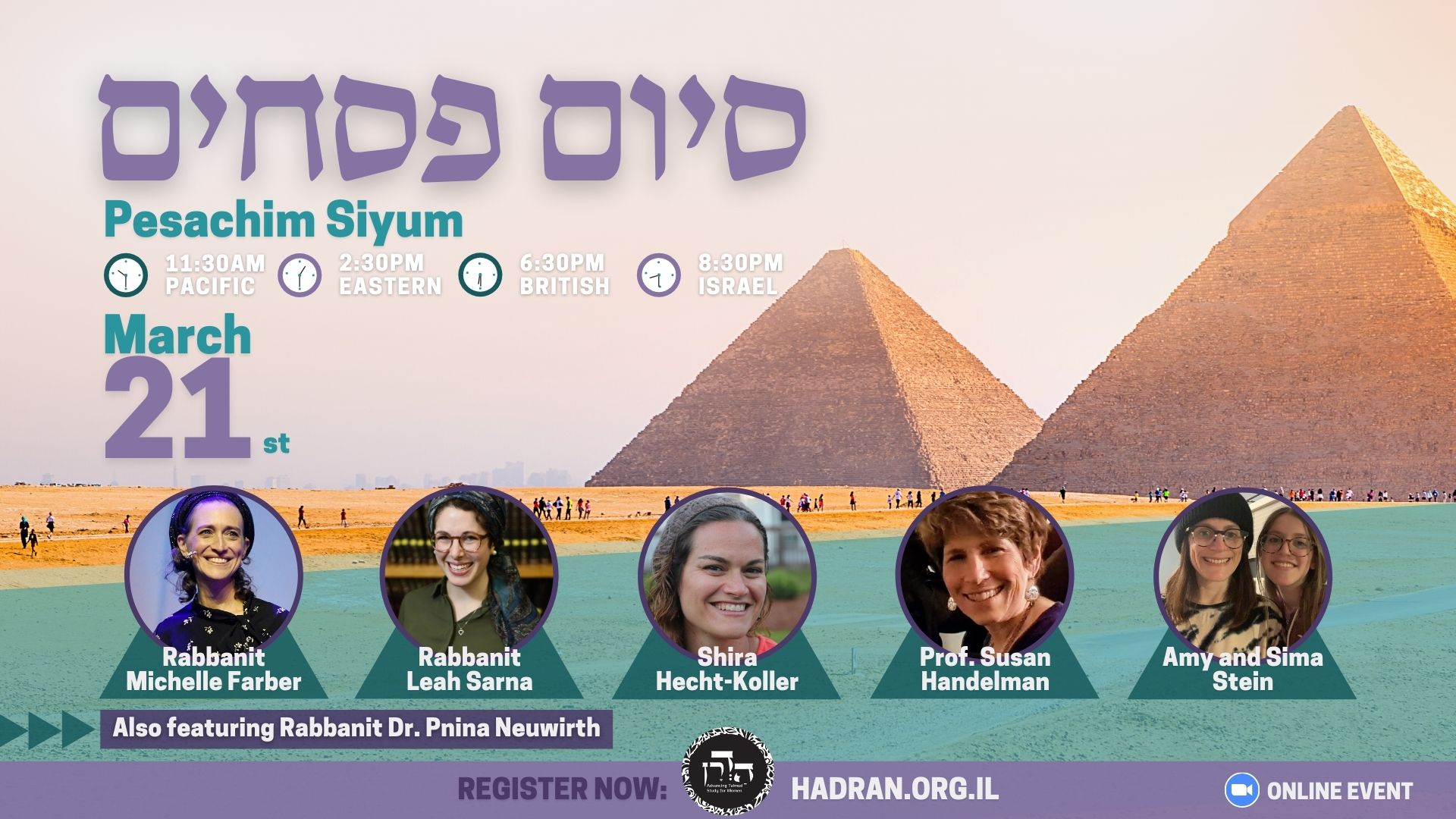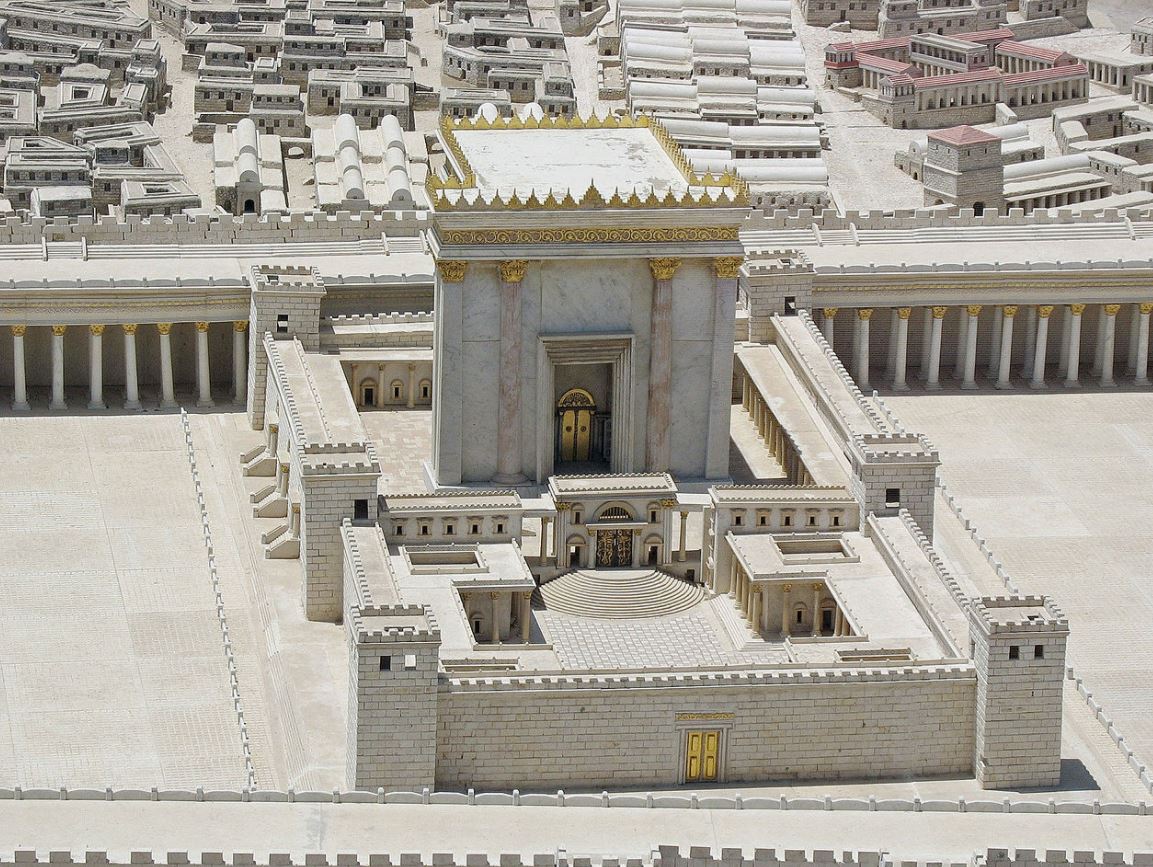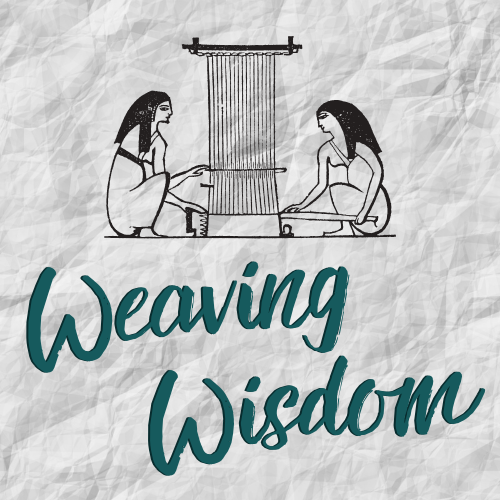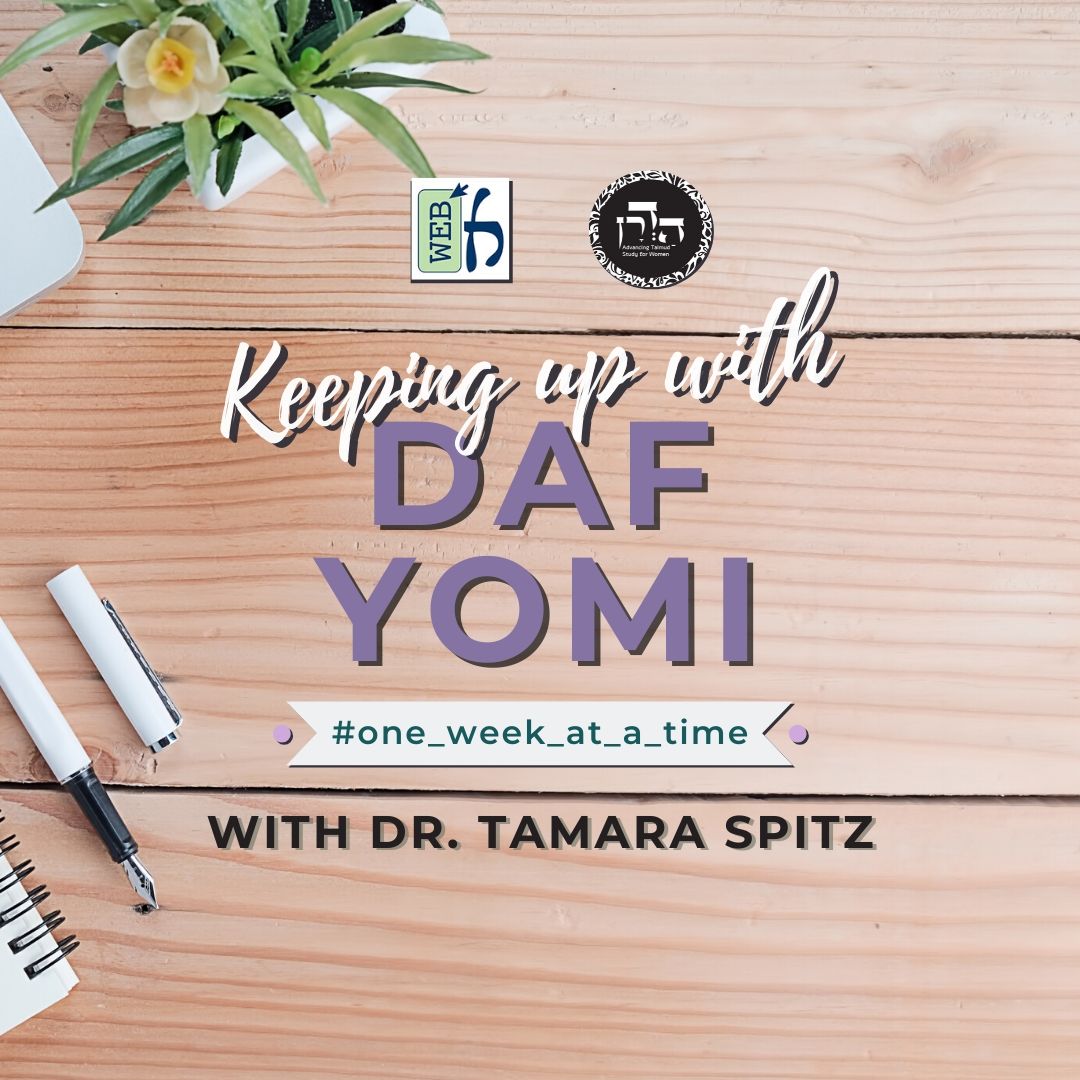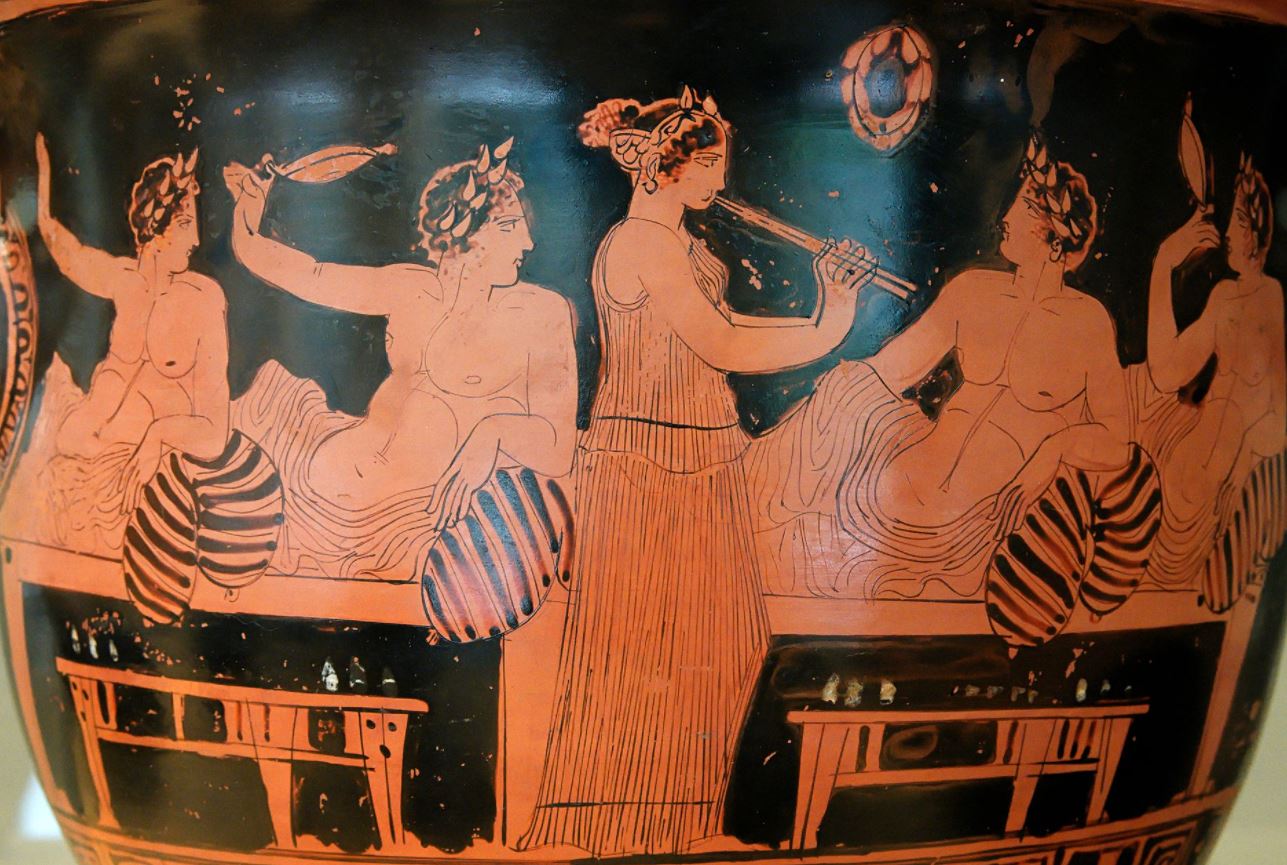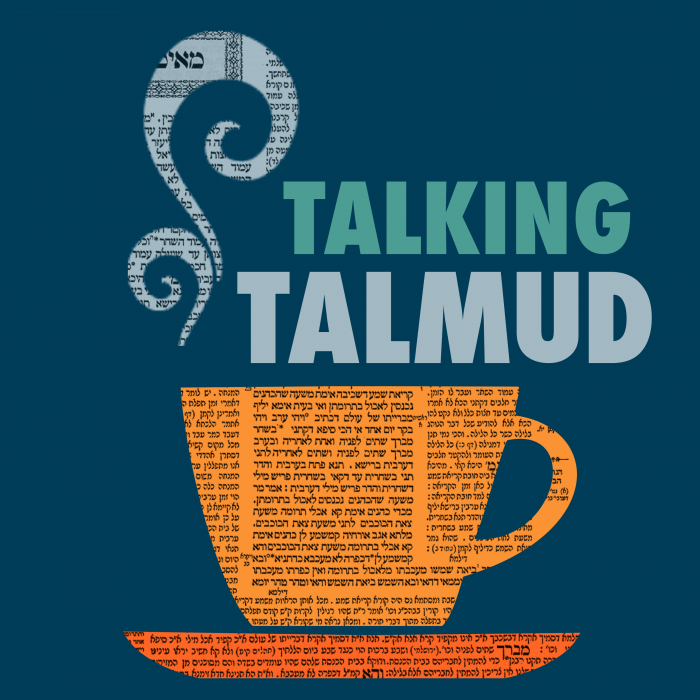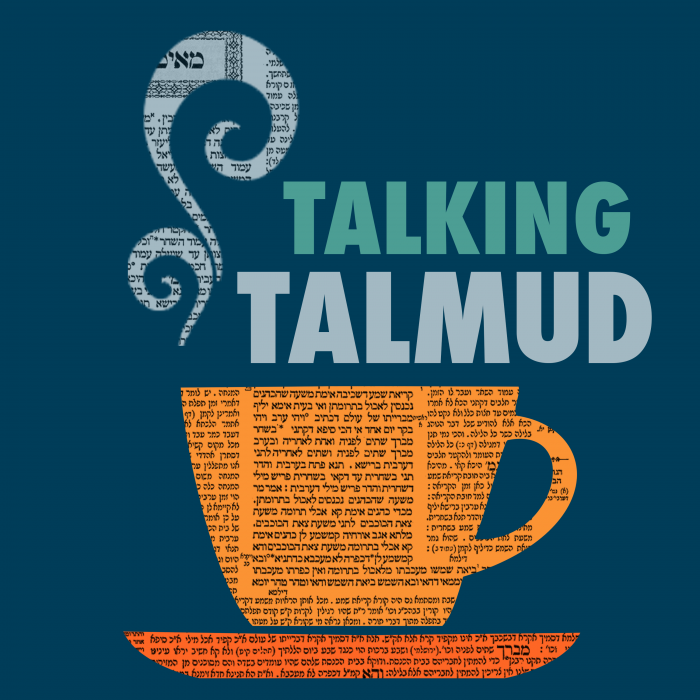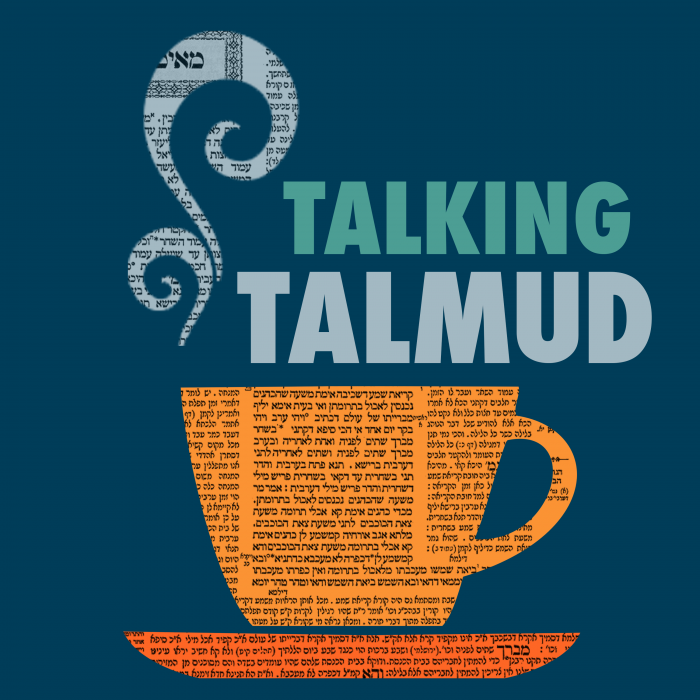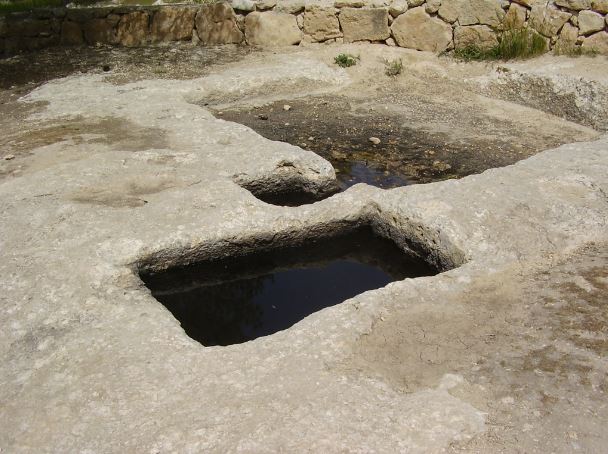Pesachim 89
מִשּׁוּם דְּאִיכָּא חָזֶה וָשׁוֹק, דְּכֹהֲנִים הוּא דְּאָכְלִי לֵיהּ.
because there are the breast and the hind leg, which the priests eat only if the offering is a peace-offering, but not if it is a Paschal lamb. Due to the distinction between the two types of offerings, the proposed stipulation does not provide a solution. It would remain unclear who should eat these portions of the offering.
וְנַיְתֵי כׇּל חַד וְחַד כֹּהֵן בַּהֲדֵיהּ.
The Gemara suggests that it may still be possible to find a way to use the stipulation: Let each one of these five people bringing a new Paschal lamb bring a priest to be registered with him for their Paschal lamb. Then the priest will eat the breasts and hind legs. Since the priest eats these portions of the offering in any event, there is no longer any practical distinction between the two types of offerings. The stipulation should therefore provide a solution.
הַאי כֹּהֵן הֵיכִי דָּמֵי? אִי דְּעָבֵיד פֶּסַח — דִּילְמָא הַאי פֶּסַח הוּא, וְנִמְצָא פֶּסַח נֶאֱכָל שֶׁלֹּא לִמְנוּיָו. וְאִי דְּלָא עָבֵיד פֶּסַח — דִּילְמָא שְׁלָמִים הוּא, וְלָא עָבֵיד פֶּסַח!
The Gemara rejects this suggestion: What are the circumstances of this priest? If he had already performed the ritual of the Paschal lamb during the first Pesaḥ, then, as the Gemara explained previously, he is unable to be registered to partake of a new Paschal lamb. If so, there is concern that perhaps this offering is a Paschal lamb and not a peace-offering, and it will turn out that a Paschal lamb is eaten by those who did not register for it. And if, on the other hand, the priest had not performed the ritual of the Paschal lamb on the first Pesaḥ, there is concern that perhaps this offering is a peace-offering, and it would turn out that this priest did not perform the ritual of the Paschal lamb at all.
וְנַיְתֵי כֹּל חַמְשָׁה חַד כֹּהֵן דְּלָא עֲבַד פֶּסַח, וְנִימְּנֵי עִילָּוֵיהּ הָנֵי חֲמִשָּׁה פְּסָחִים, דְּמִמָּה נַפְשָׁךְ אִיכָּא חַד דְּלָא עָבֵיד פֶּסַח, וְקָא נָפְקִי בֵּיהּ.
The Gemara modifies its suggestion: Let all five together bring one priest, who has not yet performed the ritual of the Paschal lamb. And let the priest register for all these five Paschal lambs. This should provide a solution. Whichever way you look at it, there is one person who has not yet performed the ritual of the Paschal lamb, and the priest will now fulfill his obligation together with him. If the priest then eats the breasts and hind legs of all the offerings, the stipulation should provide a viable solution.
אֶלָּא מִשּׁוּם דְּקָא מְמַעֵיט בַּאֲכִילַת שְׁלָמִים, דְּאִילּוּ פֶּסַח לְיוֹם וְלַיְלָה, וְאִילּוּ שְׁלָמִים לִשְׁנֵי יָמִים וְלַיְלָה אֶחָד.
The Gemara identifies a further distinction between a peace-offering and the Paschal lamb that precludes the use of the stipulation: Rather, the reason it is not possible to use the stipulation is because it would reduce the amount of time available for eating the peace-offering, for a Paschal lamb may be eaten only for a day and a night, whereas a peace-offering may be eaten for two days and one night. Were the stipulation to be made, all the offerings would have an uncertain status of either being a peace-offering or a Paschal lamb. They would therefore all be treated with the strictures of a Paschal lamb, and any meat remaining on the morning after the first night would have to be burnt. However, in the event that the offering was actually a peace-offering, this would be premature, since it may still be eaten for another day.
וְנַיְתֵי מוֹתַר הַפֶּסַח.
The Gemara modifies the proposed stipulation: Instead of making a stipulation between a Paschal lamb and a regular peace-offering, let each one of them specify that if they have already fulfilled their obligations to bring a Paschal lamb, their intention is to consecrate and bring the current offering as a surplus Paschal lamb. The status of a surplus Paschal lamb is usually achieved when an animal is originally consecrated as a Paschal lamb but for some reason is not offered. Such an animal is offered as a type of peace-offering.
וְנֵימָא: אִי דִּידִי בַּעַל מוּם — הַאי דְּאַיְיתַי הַשְׁתָּא נִיהְוֵי פֶּסַח, אִי דִּידִי תָּם הוּא — נִיהְוֵי הַאי דְּאַיְיתַי הַשְׁתָּא שְׁלָמִים, דְּמוֹתַר הַפֶּסַח נֶאֱכָל לְיוֹם וְלַיְלָה אֶחָד.
The Gemara assumes here that it is also possible to consecrate an animal directly with this status, and therefore the following stipulation could be used. And when bringing their lambs they should each say: If mine was the blemished lamb, this lamb that I am bringing now shall be a Paschal lamb; and if mine was unblemished, this lamb that I am bringing now shall be a surplus Paschal lamb, which is a type of peace-offering and may therefore be offered even if one has already fulfilled his obligation to bring a Paschal lamb. Although a surplus Paschal lamb has the sanctity of a peace-offering, it may be eaten for only one day and one night, similar to a Paschal lamb. Since there is no distinction between the time allotted to eat the two types of offerings, this stipulation should provide a solution.
וְכִי מַפְרִישִׁין תְּחִלָּה לַמּוֹתָרוֹת?! וְנִטְרְחוּ וְנַיְיתֵי מוֹתַר הַפֶּסַח!
The Gemara challenges this suggestion: But can we designate animals initially as surplus Paschal lambs? This cannot be done; the sanctity of a surplus Paschal lamb is achieved only with an animal that was initially designated for a Paschal lamb but remained unused. If so, how is the suggested stipulation tenable? The Gemara explains: Let them trouble themselves to find and bring an unused leftover animal already invested with the sanctity of a surplus Paschal lamb, and let them make the suggested stipulation upon it. In this way, the stipulation should work and provide a solution.
אֶלָּא מִשּׁוּם סְמִיכָה. דְּאִילּוּ פֶּסַח לָא בָּעֵי סְמִיכָה, וְאִילּוּ מוֹתָר בָּעֵי סְמִיכָה.
The Gemara identifies a distinction that exists even between a Paschal lamb and a surplus Paschal lamb that precludes the use of even this suggested stipulation. Rather, it is not possible to use the stipulation because of the requirement to perform the act of placing one’s hands on the head of the offering, for a Paschal lamb does not need the act of placing one’s hands, whereas a surplus Paschal lamb, since it is a type of peace-offering, does need the act of placing one’s hands. Due to this distinction, the proposed stipulation cannot provide a solution. It would remain unclear whether the offering requires one to perform the act of placing one’s hands on its head, an act that one is prohibited to do on an offering that does not require it.
הָא תִּינַח קׇרְבַּן אֲנָשִׁים. קׇרְבַּן נָשִׁים, מַאי אִיכָּא לְמֵימַר?
This distinction works out well to explain why the stipulation can’t be used for an offering of men, since a man’s offering requires the act of placing one’s hands. However, if the case involved an offering of women, for which there is no such requirement, what is there to say? In such a case, there is no distinction between a Paschal lamb and a surplus Paschal lamb, and therefore the stipulation should provide a solution.
אֶלָּא מִשּׁוּם מַתָּנוֹת. דְּאִילּוּ פֶּסַח — מַתָּנָה אַחַת, וְאִילּוּ שְׁלָמִים — שְׁתַּיִם שֶׁהֵן אַרְבַּע.
The Gemara identifies a further distinction between a Paschal lamb and a surplus Paschal lamb that precludes the use of the stipulation: Rather, it is not possible to use the stipulation because of the requirement to apply presentations of sacrificial blood upon the altar. For whereas the blood of a Paschal lamb is applied to the altar in one presentation, the blood of a peace-offering is applied to the altar with two that constitute four, i.e., the blood is applied on two opposite corners so that it runs down all four sides of the altar.
מַאי נָפְקָא מִינַּהּ? וְהָא תְּנַן: כׇּל הַנִּיתָּנִין עַל מִזְבֵּחַ הַחִיצוֹן שֶׁנְּתָנָן בְּמַתַּן אַחַת — כִּפֵּר,
What difference does the distinction in the number of presentations make? Didn’t we learn in a mishna: With regard to all offerings whose blood must be presented upon the outer altar, once the blood has been presented with one presentation, the offering has atoned, even if more presentations are ideally required? If so, it should be possible to use the stipulation and then make a single presentation of blood upon the altar, which would be valid for whichever type of offering it turned out to be.
אֶלָּא מִשּׁוּם דְּאִילּוּ פֶּסַח בִּשְׁפִיכָה, וְאִילּוּ שְׁלָמִים בִּזְרִיקָה.
The Gemara identifies a further distinction: Rather, the proposal is not possible because of the following: Whereas the blood of the Paschal lamb must be applied to the altar by pouring it on the base of the altar, the blood of a peace-offering is applied by sprinkling it upon the altar.
מַאי נָפְקָא מִינַּהּ? וְהָא תַּנְיָא: כׇּל הַנִּיתָּנִין בִּזְרִיקָה שֶׁנְּתָנָן בִּשְׁפִיכָה יָצָא. אֵימַר דְּקָא אָמְרִינַן דְּאִי עֲבַד, לְכַתְּחִלָּה נָמֵי?!
What difference does the manner of applying the blood make? Wasn’t it taught in a baraita: In the case of all offerings whose blood must be applied to the altar by sprinkling, if one applied their blood by pouring, one has nonetheless fulfilled one’s obligation? If so, it should be possible to use the stipulation and then pour the blood upon the base of the altar. This pouring would be valid, whichever type of offering it turned out to be. The Gemara answers: Say in response that we say that one fulfilled his obligation only if he already did it this way; but would he be allowed to do so ab initio as well? Certainly not. Since the offering cannot be offered in a manner that is permissible ab initio, the distinction in the manner of applying the blood will preclude the use of the stipulation.
מַתְנִי׳ הָאוֹמֵר לְבָנָיו: הֲרֵינִי שׁוֹחֵט אֶת הַפֶּסַח עַל מִי שֶׁיַּעֲלֶה מִכֶּם רִאשׁוֹן לִירוּשָׁלַיִם, כֵּיוָן שֶׁהִכְנִיס הָרִאשׁוֹן רֹאשׁוֹ וְרוּבּוֹ — זָכָה בְּחֶלְקוֹ וּמְזַכֶּה אֶת אֶחָיו עִמּוֹ.
MISHNA: In the case of one who says to his children: I am slaughtering the Paschal lamb on behalf of whomever of you goes up first to Jerusalem, as soon as the first of the children has entered his head and the majority of his body into Jerusalem, he has acquired his portion and acquires on behalf of his brothers their portions together with him.
גְּמָ׳ שְׁמַע מִינַּהּ יֵשׁ בְּרֵירָה!
GEMARA: The Gemara suggests: You can learn from the case in the mishna that there is retroactive clarification. Although when the father slaughters the Paschal lamb it cannot be known which child will ultimately enter Jerusalem first, once one of the children does enter, the children are considered to have been registered for the father’s Paschal lamb from the outset. This is problematic, as no halakhic conclusion has been reached in the matter of retroactive clarification.
אָמַר רַבִּי יוֹחָנָן, כְּדֵי לְזָרְזָן בְּמִצְוֹת קָאָמַר.
Rabbi Yoḥanan said: The mishna is not based on retroactive clarification. Rather, the father included all his children in his Paschal lamb from the outset. He created this competition only in order to enthuse them, so that they would be expeditious in their fulfillment of mitzvot; but in fact his statement had no halakhic implications.
דַּיְקָא נָמֵי דְּקָתָנֵי: וּמְזַכֶּה אֶחָיו עִמּוֹ, אִי אָמְרַתְּ בִּשְׁלָמָא דְּאַמְנִינְהוּ מֵעִיקָּרָא — שַׁפִּיר, אֶלָּא אִי אָמְרַתְּ דְּלָא אַמְנִינְהוּ מֵעִיקָּרָא, לְבָתַר דְּשָׁחֵיט מִי קָא מִתְמַנּוּ? וְהָא תְּנַן: נִמְנִין וּמוֹשְׁכִין יְדֵיהֶן מִמֶּנּוּ עַד שֶׁיִּשָּׁחֵט. שְׁמַע מִינַּהּ.
According to the explanation of Rabbi Yoḥanan, the language of the mishna is also precise, as it teaches: And he acquires on behalf of his brothers their portions together with him. Granted, if you say that the father registered them from the beginning, before slaughtering the Paschal lamb, the case is well understood. But if you say that he did not register them from the beginning, but only after he slaughtered the Paschal lamb, can they then be registered? Didn’t we learn in a mishna: People can be registered and withdraw themselves from being registered for a Paschal lamb until it is slaughtered, but not after? Clearly, then, the children must have already been registered from the outset, and we may learn from this precise reading of the mishna that Rabbi Yoḥanan’s explanation is correct.
תַּנְיָא נָמֵי הָכִי: מַעֲשֶׂה וְקָדְמוּ בָּנוֹת לְבָנִים, וְנִמְצָא בָּנוֹת זְרִיזוֹת וּבָנִים שְׁפָלִים.
That the competition was meant only to enthuse his children to be expeditious in their fulfillment of mitzvot was also implied by that which was taught in the conclusion of a baraita that also records this competition: There was an incident such as this, and the daughters preceded the sons. And it turned out that the daughters demonstrated that they were enthusiastic, whereas the sons demonstrated that they were lazy.
מַתְנִי׳ לְעוֹלָם נִמְנִין עָלָיו עַד שֶׁיִּהְיֶה בּוֹ כְּזַיִת לְכׇל אֶחָד וְאֶחָד. נִמְנִין וּמוֹשְׁכִין אֶת יְדֵיהֶן מִמֶּנּוּ עַד שֶׁיִּשָּׁחֵט. רַבִּי שִׁמְעוֹן אוֹמֵר: עַד שֶׁיִּזָּרֵק אֶת הַדָּם.
MISHNA: Additional people can always be registered for a Paschal lamb, as long as there will be at least an olive-bulk of the lamb’s meat for each and every person registered. People can be registered and withdraw themselves from being registered for a Paschal lamb until it is slaughtered. Rabbi Shimon says: Even until the priest sprinkles the blood.
גְּמָ׳ מַאי קָא מַשְׁמַע לַן? הָא קָא מַשְׁמַע לַן דְּאַף עַל גַּב דְּאִימְּנִי עָלָיו חֲבוּרָה זוֹ, חוֹזֶרֶת וְנִמְנִין עָלָיו חֲבוּרָה אַחֶרֶת.
GEMARA: What is the first clause of the mishna teaching us? It is obvious that additional people can be registered. This comes to teach us that although this group was registered for it, the entire group can withdraw and a different group can register for it, despite the fact that no one from the original group remains.
נִמְנִין וּמוֹשְׁכִין אֶת יְדֵיהֶן עַד שֶׁיִּשָּׁחֵט וְכוּ׳. אָמַר אַבָּיֵי: מַחֲלוֹקֶת לִימָּשֵׁךְ,
We learned in the mishna: People can be registered and withdraw themselves from being registered for a Paschal lamb until it is slaughtered. Rabbi Shimon says: Even until the priest sprinkles the blood. The Gemara discusses the scope of the dispute between the first tanna and Rabbi Shimon: Abaye said: The dispute is only with regard to when one is able to withdraw from being registered. Both sides derive their opinions from the following verse: “And if the household be too little for a lamb [miheyot miseh], then shall he and his neighbor next to his house take one according to the number of the souls; according to every man’s eating you shall make your count for the lamb” (Exodus 12:4). The phrase miheyot miseh literally means: From being from a lamb. It is exegetically interpreted to refer to withdrawing from being registered for a lamb.
דְּרַבָּנַן סָבְרִי: ״מִהְיוֹת מִשֶּׂה״ — מֵחַיּוּתֵיהּ דְּשֶׂה. וְרַבִּי שִׁמְעוֹן סָבַר: מֵהֲוָיָיתֵיהּ דְּשֶׂה. אֲבָל לִימָּנוֹת — דִּבְרֵי הַכֹּל עַד שֶׁיִּשָּׁחֵט, דְּאָמַר קְרָא: ״בְּמִכְסַת נְפָשֹׁת״, וַהֲדַר: ״תָּכֹסּוּ״.
The Rabbis hold that “from being [miheyot] from a lamb” indicates that one can withdraw only during the life [meiḥayutei] of the lamb, i.e., while the lamb is still alive. And Rabbi Shimon holds that the phrase indicates that one can withdraw during the happenings [meihavayatei] of the lamb, i.e., as long as the sacrificial service is still being performed, which culminates with the application of the blood upon the altar. But with regard to being registered for the Paschal lamb, all agree that one can be registered for a lamb only until it is slaughtered, as the previously cited verse concerning registration states, in its conclusion: “According to the number [bemikhsat] of the people,” and then “you shall make your count [takhosu].” The word takhosu is taken to mean: You shall slaughter, in accordance with its meaning in Aramaic. The order of the verse therefore indicates that people can be registered only prior to the animal’s slaughter.
תַּנְיָא נָמֵי הָכִי: נִמְנִין וּמוֹשְׁכִין אֶת יְדֵיהֶן מִמֶּנּוּ עַד שֶׁיִּשָּׁחֵט, רַבִּי שִׁמְעוֹן אוֹמֵר: נִמְנִין עַד שֶׁיִּשָּׁחֵט, וּמוֹשְׁכִין עַד שֶׁיִּזָּרֵק הַדָּם.
That was also taught in a baraita: People can be registered and withdraw themselves from being registered for a Paschal lamb until it is slaughtered. Rabbi Shimon says: They can be registered until it is slaughtered and withdraw themselves from being registered until the priest sprinkles the blood.
מַתְנִי׳ הַמְמַנֶּה עִמּוֹ אַחֵר בְּחֶלְקוֹ — רַשָּׁאִין בְּנֵי חֲבוּרָה לִיתֵּן לוֹ אֶת שֶׁלּוֹ, וְהוּא אוֹכֵל מִשֶּׁלּוֹ, וְהֵן אוֹכְלִין מִשֶּׁלָּהֶן.
MISHNA: If one who is registered for a Paschal lamb unilaterally registers another person with him in his portion of the Paschal lamb, the other members of his group are permitted to give him, i.e., the one who included the additional person, only his portion, which was originally allotted to him. And he, the additional person, eats from his portion, i.e., the portion of he who added him; and they, the other members of the group, eat from theirs. This is because they did not agree to the inclusion of the additional person.
גְּמָ׳ אִיבַּעְיָא לְהוּ: בְּנֵי חֲבוּרָה שֶׁהָיוּ יָדָיו שֶׁל אֶחָד מֵהֶן יָפוֹת, מַהוּ שֶׁיֹּאמְרוּ לוֹ: טוֹל חֶלְקְךָ וָצֵא. מִי אָמְרִינַן, מָצֵי אֲמַר לְהוּ: הָא קַבֵּילְתּוּן. אוֹ דִילְמָא, מָצוּ לְמֵימַר לֵיהּ: כִּי קַבֵּלְינַן — לְתַיקּוֹנֵי זְבִיחָה, אַדַּעְתָּא דְּאָכְלַתְּ טְפֵי מִינַּן — לָא קַבֵּלְינָךְ.
GEMARA: A dilemma was raised before the Sages: If there is among the members of a group one of them who has fine hands, a euphemism for one who always hastens to take a large quantity of food, what is the halakha concerning whether they can say to him: Take your allotted portion to eat and leave; and don’t take any more from the other’s members portions? Do we say that he can say to them: You accepted me in the group without preconditions, and you therefore have no right to limit how much I can take now? Or perhaps they can say to him: When we accepted you, it was only for the preparation of the offering, to ensure that enough people would be registered to guarantee that the entire offering would be eaten with none left over. However, we did not accept you with the understanding that you would eat considerably more than us.
תָּא שְׁמַע: הַמְמַנֶּה אֲחֵרִים עִמּוֹ עַל חֶלְקוֹ — רַשָּׁאִין [בְּנֵי חֲבוּרָה] לִיתֵּן לוֹ אֶת שֶׁלּוֹ, וְהוּא אוֹכֵל אֶת שֶׁלּוֹ, וְהֵן אוֹכְלִין אֶת שֶׁלָּהֶן. מַאי טַעְמָא? לָאו מִשּׁוּם דְּהָוֵי לֵיהּ כְּיָדַיִם שֶׁל אֶחָד מֵהֶן יָפוֹת. וְאִי סָלְקָא דַעְתָּךְ יָדָיו יָפוֹת מָצֵי אֲמַר לְהוּ קַבֵּילְתּוּן, נִיהְוֵי הַאי כְּיָדָיו יָפוֹת!
Come and hear a resolution to the dilemma from what we learned in the mishna: If one who registered for a Paschal lamb registers other people with him in his portion, the other members of the group are permitted to give him only his portion. And then he and the additional people eat from his portion, and they, the other members of the group, eat from theirs. What is the reason for this? Is it not because it is comparable to a case where one of them has fine hands, because in the case of one who adds a person, he and the additional person together eat more than one portion? And if it could enter your mind to say that one with fine hands can say to them: You accepted me without preconditions, then this person, who registered an additional person to join him, should be considered as though he had fine hands, and he should be able to take a double portion. Therefore, the mishna rules that the group can limit the quantity of food he takes. It is apparent that the claim of one with fine hands is not accepted.
אָמְרִי: לָא, דֵּעוֹת שָׁאנֵי, דְּאִי נָמֵי תַּרְוַיְיהוּ כְּחַד מִבְּנֵי חֲבוּרָה הוּא דְּאָכְלִי, מָצֵי אָמְרִי לֵיהּ: דְּלָא נִיחָא לַן אִינָשׁ נוּכְרָא גַּבָּן.
The Gemara rejects this proof: They say: No, a comparison should not be drawn. Including additional people of individual minds is different. Even if both of them together would eat a quantity equivalent to a single member of the group, the other members of the group can nonetheless say to him: It is not pleasant for us to have a strange person among us. Therefore, no proof can be offered from the mishna.
תָּא שְׁמַע: הַשַּׁמָּשׁ שֶׁאָכַל כְּזַיִת בָּשָׂר בְּצַד הַתַּנּוּר, אִם הָיָה פִּקֵּחַ — מְמַלֵּא כְּרֵיסוֹ מִמֶּנּוּ. אִם רָצוּ בְּנֵי חֲבוּרָה לַעֲשׂוֹת טוֹבָה עִמּוֹ — בָּאִין וְיוֹשְׁבִין בְּצִדּוֹ וְאוֹכְלִין, דִּבְרֵי רַבִּי יְהוּדָה. רָצוּ — אִין, לֹא רָצוּ — לָא. וְאַמַּאי? נֵימָא לְהוּ: הָא קַבֵּילְתּוּן.
Come and hear a resolution to the question from another mishna: In the case of an attendant who ate an olive-bulk of meat of the Paschal lamb next to the oven in which it is being roasted, if he were judicious, he should continue eating there to fill his stomach with it. By eating an olive-bulk, he has established his current location as his place for eating his Paschal lamb, and he may not eat any more in an additional location. If the members of the group wanted to do him a favor so that he may continue eating, they can come and sit at his side and eat there; this is the statement of Rabbi Yehuda. The Gemara makes the following inference: If they wanted to do him a favor, yes; but if they did not want to do so, no. But why should this be left to their discretion? Let him say to them: You accepted me unconditionally into the group, and therefore you have no right to prevent me from continuing to eat. The latter claim is not accepted, as is apparent by the mishna’s ruling that it is left to the group’s discretion
שָׁאנֵי הָתָם, דְּאָמְרִי לֵיהּ: כִּי קַבֵּלְינָךְ — אַדַּעְתָּא דְּנַטְרְחָךְ קַמַּן. לְמִטְרַח לַן לְדִידָךְ — לָא קַבֵּלְינָךְ.
It is different there, in the case of an attendant, for they can say to him: When we accepted you, it was with the understanding that you would exert yourself before us and provide our needs by serving as our waiter; but for us to exert ourselves by moving to a place that is convenient for you, we did not accept you. Therefore, no proof can be derived from the mishna.
תָּא שְׁמַע: בְּנֵי חֲבוּרָה שֶׁהָיָה יָדָיו שֶׁל אֶחָד מֵהֶן יָפוֹת, רַשָּׁאִין לוֹמַר: טוֹל חֶלְקְךָ וָצֵא. וְלֹא עוֹד, אֶלָּא אֲפִילּוּ חֲמִשָּׁה וְעָשׂוּ סִיבּוֹלֶת, רַשָּׁאִין לוֹמַר לוֹ: טוֹל חֶלְקְךָ וָצֵא. שְׁמַע מִינַּהּ.
Come and hear an explicit resolution to this question from the Tosefta: Members of a group in which one of the group had fine hands are permitted to say to him: Take your allotted portion to eat and leave; don’t take any more from the other members’ portions. And not only is this true of a group sharing a Paschal lamb, but even five people who made a shared meal of friends [sibolet] throughout the year are permitted to say to one who has fine hands: Take your portion and leave. The Gemara concludes: Indeed, learn from this that that is the ruling.
מַאי ״וְלֹא עוֹד״? לָא מִיבַּעְיָא קָאָמַר. לָא מִיבַּעְיָא פֶּסַח, דְּמָצֵי אָמְרִי לֵיהּ: כִּי קַבֵּלְינָךְ לְתַקּוֹנֵי זְבִיחָה, אֶלָּא אֲפִילּוּ סִיבּוֹלֶת נָמֵי, דְּצַוְותָּא בְּעָלְמָא הוּא, רַשָּׁאִין לוֹמַר לוֹ: טוֹל חֶלְקְךָ וָצֵא.
The Gemara discusses the text of the Tosefta: What new ruling is introduced by the expression: And not only? The Tosefta is speaking employing the style of: There is no need. The Gemara explains: There is no need to state this rule in the case of a group sharing a Paschal lamb, since they have a strong claim, as they can say to him: When we accepted you, it was only for the preparation of the offering, to ensure that there would be enough people to guarantee that the entire offering would be eaten. It is therefore immediately understood that the group retains a right to limit the size of the portion he takes. Rather, the Tosefta emphasizes that even with regard to a shared friendly meal, which is for the sake of companionship only, they are permitted to say to him: Take your portion and leave.
אִיכָּא דְאָמְרִי: הָא לָא אִיבַּעְיָא לַן, אֶלָּא הָכִי הוּא דְּאִיבַּעְיָא לַן: בְּנֵי חֲבוּרָה רַשָּׁאִין לְחַלֵּק, אוֹ אֵינָן רַשָּׁאִין לְחַלֵּק?
There are those who say that this question concerning what a group may say to a member who has fine hands is not our dilemma. Rather, this is our dilemma: Are members of a group permitted to divide up into smaller separate groups, or are they not allowed to divide up if there is no special reason to do so?
תָּא שְׁמַע: בְּנֵי חֲבוּרָה שֶׁהָיוּ יָדָיו שֶׁל אֶחָד מֵהֶן יָפוֹת — רַשָּׁאִין לוֹמַר לוֹ: טוֹל חֶלְקְךָ וָצֵא. יָדָיו יָפוֹת — אִין, אֵין יָדָיו יָפוֹת — לָא. שְׁמַע מִינַּהּ.
Come and hear a resolution: Members of a group in which one of them had fine hands are permitted to say to him: Take your portion and leave, which is equivalent to instructing him to form his own group, albeit of only one person. This indicates that only if his hands are fine, yes, they may divide into separate groups, but if his hands are not fine, no, they may not. The Gemara concludes: Indeed, learn from this that they are not allowed to divide up into separate groups for no reason.
רַב פָּפָּא וְרַב הוּנָא בְּרֵיהּ דְּרַב יְהוֹשֻׁעַ עָרִיבוּ רִיפְתָּא בַּהֲדֵי הֲדָדֵי. אַדְּאָכֵיל רַב הוּנָא בְּרֵיהּ דְּרַב יְהוֹשֻׁעַ חֲדָא, אָכֵיל רַב פָּפָּא אַרְבַּע. אֲמַר לֵיהּ: פְּלַג לִי. אֲמַר לֵיהּ: קַבֵּילְתּוּן.
Incidental to this discussion, the Gemara recounts a related incident: Rav Pappa and Rav Huna, son of Rav Yehoshua, mixed their bread together in order to share it between them. By the time Rav Huna, son of Rav Yehoshua, ate one slice, Rav Pappa ate four slices. Rav Huna said to him: Let us stop sharing. Instead, divide the meal with me so that I can eat my portion. He said to him: You accepted my companionship, and it is improper to now retract.
אֵיתִיבֵיהּ כׇּל הָנֵי תְּיוּבָתָא, וְשַׁנִּי כִּדְשַׁנִּינַן. אֵיתִיבֵיהּ בְּנֵי חֲבוּרָה. אֲמַר לֵיהּ: הָתָם דְּאָמְרִי לֵיהּ כִּי קַבֵּלְינָךְ — לְתַיקּוֹנֵי זְבִיחָה. אֵיתִיבֵיהּ סִיבּוֹלֶת, פְּלַג לֵיהּ.
Rav Huna raised all these objections mentioned previously, and Rav Pappa answered him as we answered that those cases dealt with exceptional circumstances. Rav Huna then raised an objection from the mishna with regard to the members of a group sharing a Paschal lamb. Rav Pappa said to him: There, they are permitted to limit his portion only because they can say to him: When we accepted you it was for the preparation of the sacrifice, but when friends share a meal it is with the understanding that each one will fully participate regardless of how much he eats. Rav Huna finally raised an objection from the ruling of the Tosefta concerning a shared meal. Rav Pappa accepted the proof and divided the meal with him.
אֲזַל עָרֵיב בַּהֲדֵי רָבִינָא. אַדְּאָכֵיל רַב הוּנָא בְּרֵיהּ דְּרַב יְהוֹשֻׁעַ חֲדָא, אָכֵיל רָבִינָא תְּמָנְיָא. אֲמַר: מְאָה פָּפֵּי וְלָא חֲדָא רָבִינָא.
On another occasion Rav Huna, son of Rav Yehoshua, went and mixed his bread together with Ravina. By the time Rav Huna, son of Rav Yehoshua, ate one slice, Ravina ate eight. Rav Huna said jokingly: It is better to eat together with one hundred Pappas and not with one Ravina, because Ravina eats significantly more.
תָּנוּ רַבָּנַן: הַמְמַנֶּה אֲחֵרִים עִמּוֹ עַל פִּסְחוֹ וְעַל חֲגִיגָתוֹ — מָעוֹת שֶׁבְּיָדוֹ חוּלִּין. וְהַמּוֹכֵר עוֹלָתוֹ וּשְׁלָמָיו — לֹא עָשָׂה וְלֹא כְּלוּם, וּמָעוֹת כׇּל שֶׁהֵן יִפְּלוּ לִנְדָבָה.
The Sages taught in a baraita: One who registers others with him for his Paschal lamb or for his Festival peace-offering for the fourteenth of Nisan and takes money from them for their share, the money in his hand that he took for them is non-sacred. And one who sells his burnt-offering or peace-offerings to another person has not done anything; the sale is completely invalid, and any money he receives for the transaction should go to the Temple fund to be used for the purchase of public free-will offerings which will be sacrificed as burnt–offerings.
וְכִי מֵאַחַר דְּלֹא עָשָׂה וְלֹא כְּלוּם, מָעוֹת אַמַּאי יִפְּלוּ לִנְדָבָה? אָמַר רָבָא: קְנָסָא. וּמַאי ״כׇּל שֶׁהֵן״ — אַף עַל גַּב דְּלָא הֲווֹ שָׁווּ אֶלָּא אַרְבְּעָה, וִיהַבוּ לֵיהּ חַמְשָׁה — אֲפִילּוּ בְּהָהִיא יַתִּירָא נָמֵי קַנְסוּהוּ רַבָּנַן.
The Gemara asks: But since he has not done anything, the sale being completely invalid, why does the money fall to the fund used for free-will offerings? The money should remain non-sacred. Rava said: It is a fine that the Sages imposed to dissuade people from attempting to purchase others’ offerings. And what is the meaning of the phrase: And any money? It indicates that, although these offerings were worth only four zuz and they mistakenly gave him five zuz, even with regard to that extra zuz the Sages also fined him. They required it to be used for free-will offerings rather than considering the extra money a gift to the seller.
אָמַר עוּלָּא, וְאִיתֵּימָא רַבִּי אוֹשַׁעְיָא: אֶפְשָׁר יָדְעִי חַבְרִין בַּבְלָאֵי טַעְמָא דְּהַאי מִלְּתָא. זֶה הִפְרִישׁ טָלֶה לְפִסְחוֹ, וְזֶה הִפְרִישׁ מָעוֹת לְפִסְחוֹ, הֵיאַךְ הֶקְדֵּשׁ חָל עַל הֶקְדֵּשׁ, דְּקָתָנֵי: מָעוֹת שֶׁבְּיָדוֹ חוּלִּין?
Ulla said, and some say it was Rabbi Oshaya: Is it possible that our Babylonian friends know the reason of this following matter: This person designated a lamb for his Paschal lamb, consecrating it as such; and this other person designated money to give to the owner of the lamb in order to register with his Paschal lamb, consecrating the money for that purpose. The sanctity endowed in the money can be removed from it only when transferred to the lamb upon purchasing a portion in it. Ulla questions the rationale for this: How does the sanctity of the money take effect upon and transfer to the Paschal lamb, which is itself already sacred, as implied by the baraita that teaches that the money in his hand is non-sacred, clearly indicating that the sanctity was indeed transferred from the money? Surely, if it is already sacred, no more sanctity can be transferred to it.



